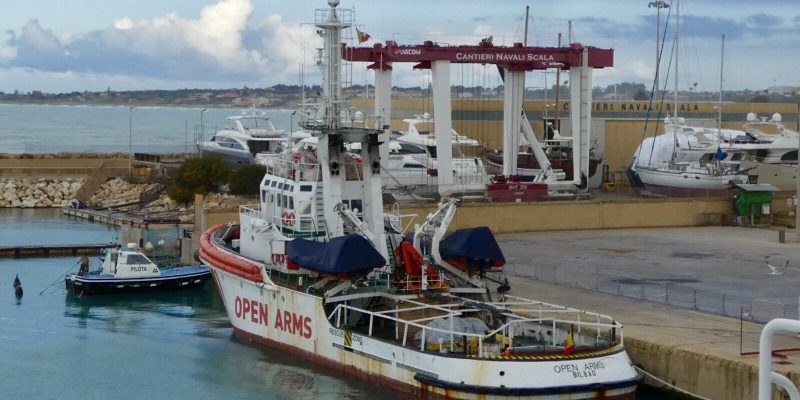1. Risking your life at sea after fleeing Libya
A migrant jumped from a vessel in the Mediterranean taking him and other migrants away from Libya. He jumped when it was approached by the Libyan coast guard. The man attempted to reach the nearby tug boat Vos Triton. A Sea Watch search and rescue aircraft contacted the tug boat asking the crew to “take all necessary steps to rescue the person”.
Meanwhile, in Italy, the controversy over racism is still hot. In the latest viral video, a 36-year-old train manager talked about the increasingly common incidents of mobbing against (presumed) illegal immigrants on trains.
2. No link between NGOs and human traffickers
After a two-year investigation, the Catania prosecutors have shut down the accusations of collusion between the NGOs and human traffickers. The judge has ruled in favour of dismissing the charges against the commander and the mission chief of Spanish NGO ProActiva Open Arms, who had been accused of criminal conspiracy to facilitate illegal immigration. The investigation was launched after the ship rescued more than 200 people off the coast of Libya in March 2018, when rescuers had refused to hand the migrants over to the Libyan coastguard. The case built by prosecutor Zuccaro has been dismantled. “We are happy to hear that a further step towards the truth has been taken”, ProActiva Open Arms said.
3. Refugees who committed crimes cannot be automatically returned
The right to protection cannot be denied to refugees, even those who commit crimes, if they will face inhuman or degrading treatment upon return. The Court of Justice of the European Union has issued a ruling expanding the parameters for granting refugee status. Upon deciding on the cases of three people whose refugee status had been revoked after committing crimes, the court has ruled that the EU regulation must be interpreted and applied in a way that observes the rights guaranteed by the Charter which exclude the possibility of refoulement to such a country, regardless of any crimes committed.
4. New data on sea arrivals and rescue operations
In 2019, sea arrivals along the Central Mediterranean route have dropped by almost 90% compared to the same period last year, but the number of lives lost in that area is still tragically high. In order to shed light on a complex issue, affecting the lives of many who flee violence, war and persecution, the Italian Refugee Council has published an in-depth analysis on sea arrivals and rescue operations.
5. DIMMI, tales of migrants
“Telling about ourselves, getting to know others”: it is the goal of DIMMI di storie migranti, a project financed by AICS to build a new narrative on issues of migration, as seen through the eyes of migrants. The project offers a deeper insight into the issues of migration through direct experience, from the journals and first-hand accounts, looking beyond stereotypes and oversimplification and fostering the birth of global citizenship.
6. Mother and son reunited in Italy
A Nigerian minor has managed to finally reach Italy and reunite with his mother thanks to a ruling by a Roman court. The boy, who was ill and had already been kidnapped for ransom and intercepted at sea by the Libyan coastguard, was being held in Libya. His mother, with the support of ASGI, filed an emergency appeal before the court, which instructed the Italian foreign affairs ministry to promptly issue a humanitarian visa.
7. If Lazio lost all its foreign workers
What would happen if all immigrants in a region like Lazio were suddenly gone? The region’s gross product would drop by 19 billion euros; there would be 80,000 fewer businesses, a crack in the welfare and a 12.9% drop in employment. UIL and the Eures research institute have published a research that illustrates what the region would face if all its 680,000 foreign residents were suddenly removed.
Losses in the agricultural sector alone would lead to the cutting of 20,000 jobs. In the Pontine Marshes alone, there are 10,000 Sikh farm workers officially recorded. Last year, Daniela Sala reported on their working conditions and the exploitation they suffer at the hands of their “masters”.
8. Trump unveils new immigration plan
President Trump on Thursday unveiled an outline for reshaping how immigrants are admitted into the country, saying the U.S. must prioritize younger and highly educated immigrants to ““contribute more to our social safety net” and “restore the integrity of our broken asylum system”. But the crackdown damages the American communities that had been given new life thanks to the steady influx of refugees, as had happened in some of New York’s upstate cities.
9. A life of activism for the rights of immigrants in Australia
Christina Coombe was a 56-year-old Australian woman who dedicated her life to the fight against the detention of migrants on Manus and Nauru. Over the last few years, many Australians like her have upheld the rights of migrants forgotten on those islands. Christina died last week after a long battle with cancer. Journalist Behrouz Boochani, an Iranian refugee formerly held on Manus Island, wrote about her in the Guardian.
10. The end of the Dubs scheme
The scheme to transfer vulnerable child refugees from France to Britain is being ended. According to a report in the Guardian, young migrants in Dunkirk and Calais will no longer be allowed to be transferred to the UK under the scheme championed by Lord Dubs in 2016. Hundreds of lone children will face a much higher of criminal exploitation. What is the alternative? Many of the migrants stranded in France have no other choice but to take to the sea. Emanuela Barbiroglio had written about the migrants who desperately try to cross the Channel on boats.









